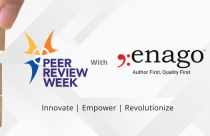Role of Identity in Peer Review- Moving Towards a Reliable System

Considered as one of the pivotal processes in the publishing industry, the peer review process involves profound evaluation of academic, scientific, or professional research work conducted by peers in the same and allied field. To celebrate the process and unfold facts and insights about peer-reviewing, the publishing industry collectively looks forward to this mega-event- Peer Review Week!
In the seventh year now, the Peer Review Week 2021 released its theme “Identity in Peer Review”, which is the first to be selected through an open global survey. As a steering committee member of Peer Review Week, Enago explores the multifaceted roles of identities in peer reviewing process that brings diversity, expectations, perspectives, experiences, knowledge, and skill together with its exclusively curated activities.
Emphasizing on “Identity in Peer Review”, we will highlight the role of personal and social identity in peer review and the ways in which scholarly community can foster a diverse, equitable, progressive, trust-worthy and ethical peer-reviewing practices.
“Identity in Peer Review”- Scholarly Community’s Enduring Concern
Since its inception in the 18th century, peer review process has transformed remarkably over the years, with an attempt to make it more rigorous and reliable. While the composition of editorial boards and reviewer panels of most major journals reflected the dominant academic culture of that time, today’s peer-reviewing system of diverse and experienced academics from different cultures have brought in a paradigm shift.
Academics have strived to bolster the peer-reviewing process with improvements and introduction of several systems such as open peer review, transparent peer review, collaborative, post-publication, single-blinded, double-blinded peer review, etc. However, revealing of personal, professional, and cultural identity in the peer review process arises the possibility of breaching ethical peer review practices. Furthermore, value of diversity, multiple perspectives, and contributions from numerous sources adds to the growth of academia and research.
Moving Towards a Reliable Peer Review Process
The advent of Open Access (OA) publishing and the COVID-19 pandemic acted as a catalyst in the growth of published research. This has provided a wide scope for new research publication in academia. Renowned and eminent open access journals have a rigorous peer-reviewing process; each article’s quality, validity, and relevance is thoroughly assessed by peer reviewer within the field.
While the process stays the same, evidence shows that the traditional peer-reviewing model needs to change. Rising journal retractions and cases of unethical and fabricated peer reviews are calling for a need to re-visit the traditional approach.
Here are a few practices to follow to pave your way towards a trust-worthy peer-reviewing system:
- Invent and follow ethical ways of identifying, verifying, and inviting peer reviewers, focusing on the closeness of subject expertise with the research being reviewed.
- Include diversity in the reviewing pool (inclusion of early career researchers, researchers from different regions and cultures, women, etc.).
- Publishers must raise awareness and investigate new ways of sourcing peer reviewers from diverse backgrounds.
- Introduce different, new, and reliable peer-reviewing models to increase transparency and bolster the trust of authors in the system.
- Train reviewers and introduce them to ethical guidelines to bridge the gap between generations of reviewers and their approach towards reviewing.
- Encourage use of automated and AI-based peer-reviewing software for a more reliable and holistic approach.
- Evaluate reviewers based on feedbacks received within recognized guidelines.
- Develop cross-publisher solutions to improve efficiency and benefit all stakeholders.
- Offers practical advices on how authors can successfully navigate and address reviewer comments and revise their papers.
- Curate a well-defined and holistically structured review reports for clear transfer of comments and suggestions to the authors.
Peer Review: A Building Block of Trusted Publishing
With the emergence in awareness, importance, and dependence of peer review, the role of identity and diversity has significantly transformed scholarly research and publication. Since, a manuscript that is reviewed properly is considered reliable, peer reviewers have been diligent in following ethical practices. Not letting external factors influence the reviewing process, maintain scientific rigor, and describing analyses logically have bolstered the trust of authors and readers in the peer-reviewing system. Since transparent peer-reviewing process can be a leveraged with identity, it could also be coherently promoted and celebrated in an opaque process.
Do you think greater emphasis on identity and diversity in the peer-reviewing process adds value to it? Does identities potentially foster collegiality, constructive critiques, progressive collaborations, etc.? Additionally, what are the other benefits associated with revealing peer reviewer identity? Will the current peer-reviewing system leverage from the added layers of identity and diversity? Let us know your thoughts in the comments section below! You can also visit our Q&A forum for frequently asked questions related to different aspects of research writing and publishing answered by our team that comprises subject-matter experts, eminent researchers, and publication experts.










